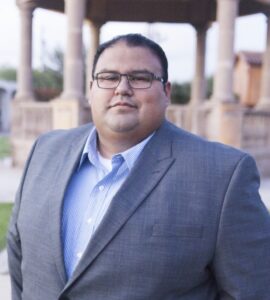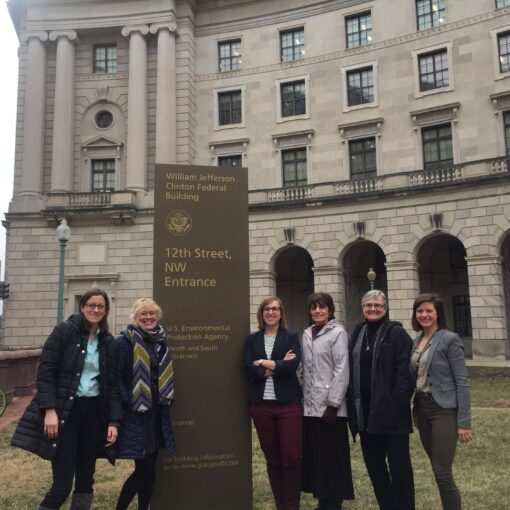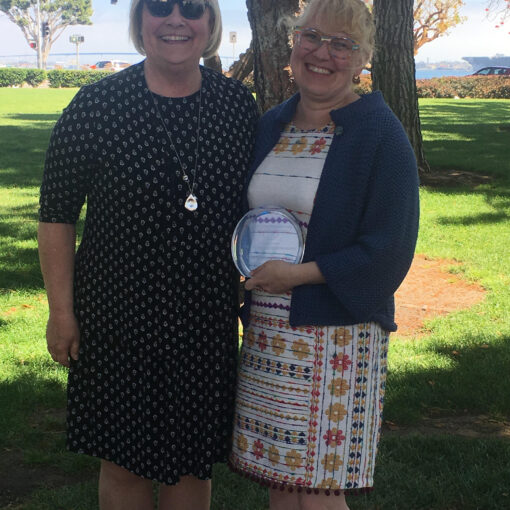 In June 2019, the Alliance of Nurses for Healthy Environments (ANHE) launched the first-of-its-kind Environmental Health Nurse Fellowship program to train nurses to work with communities in tackling serious environmental health threats. Funded by the Kresge Foundation, the program has a particular focus on climate and health equity, environmental justice, and climate resilience. Paired with expert environmental health nurse mentors, the fellows are conducting projects in partnership with communities to build support for community-driven solutions. Learn more about the nurses participating in the 2019-2020 fellowship cohort here.
In June 2019, the Alliance of Nurses for Healthy Environments (ANHE) launched the first-of-its-kind Environmental Health Nurse Fellowship program to train nurses to work with communities in tackling serious environmental health threats. Funded by the Kresge Foundation, the program has a particular focus on climate and health equity, environmental justice, and climate resilience. Paired with expert environmental health nurse mentors, the fellows are conducting projects in partnership with communities to build support for community-driven solutions. Learn more about the nurses participating in the 2019-2020 fellowship cohort here.
This month’s blog features a Q&A blog with ANHE Environmental Health Nurse Fellow Aaron Salinas, MSN, APRN, FNP-BC, PMHNP-BC, NRP. Aaron was born and raised in South Texas in the Rio Grande Valley, and he is currently working as a nurse practitioner in Edinburg, Texas. Aaron has a special interest in how environmental factors can affect mental health in children and adolescents in the Rio Grande Valley. Aaron is currently pursuing a doctor of nursing practice degree at Texas Tech University Health Sciences Center.
Aaron, thank you for your participation in the ANHE Fellowship! What brought you to the ANHE fellowship program, and what excites you about this program?
My interest in the ANHE Fellowship Program was sparked by living in one of the poorest regions in the United States, the Rio Grande Valley, and seeing residents struggle in substandard living conditions often caused partly or fully by environmental health issues. The most exciting thing about the program is the knowledge and experience I am obtaining from the fellowship. All fellows are aware of the issues that their communities are experiencing; for some people like me, finding a starting point was a challenge. This program has helped me identify a starting point, and introduced me to how environmental justice, pollution, and environmental degradation are related to human health.
Can you tell us about your experience in the fellowship program?
My experience in the fellowship program has been great. I began the fellowship with some experience and a minimal background in environmental awareness issues along the Rio Grande Valley. Working in the emergency department, I have provided care to patients who were victims of social and environmental injustice. I felt helpless at times with the little I was able to do to help them out. During the fellowship, I have learned the importance of environmental health and safety laws and regulations. I have been able to expand my knowledge and expertise in addressing unsafe environments and workplaces.
My key takeaway has been to stay true to my passion–keeping my community safe and healthy. It is important that we have a safe home and work environment, as these factors contribute greatly to our health status. Also through my experience in the fellowship, I have extended the network of experts I can call upon as resources in environmental and public health. At times we work together to reach a common goal, and that is to improve our communities’ health while raising awareness of the various environmental issues that are affecting health outcomes. Some of the challenges that I have experienced in the fellowship are that my colleagues may not see eye to eye on the various environmental issues, and the mentality of “things will not change” impedes progress in addressing these issues
Can you tell us a bit about your fellowship project and the partnering community and community-based organization?
In my fellowship project, I worked with the Kiwanis Club of Edinburg, Texas. My goal was to assess and evaluate community members’ awareness and knowledge on environmental issues such as flooding, air and water quality, lead exposure, and safety of food products. I conducted several educational sessions focused on these environmental issues that impact the health of our population in the Rio Grande Valley. I did a pre-survey to determine their current knowledge level of the issue prior to the educational session and conducted a post-survey to assess their learning after the session. I was glad to learn that our community members do care about our environment. The main challenge community members expressed was not knowing what to do or where to start to address environmental issues impacting their community. This project was a great start for these community members and empowered them to speak up about the issues they are experiencing.
How has the Fellowship program provided you with the tools and resources to address environmental health issues as a nurse working in partnership with communities and community-based organizations?
The fellowship has provided me with many tools and resources to address various environmental health issues and help our Rio Grande Valley communities. The opportunity has also allowed me to “think outside of the box” in addressing environmental health challenges. Throughout the fellowship experience, I also had various opportunities to take part in bigger projects such as advocating at the national level.
Please describe how the ANHE fellowship program has changed or shaped the way you think about your role and the role of nurses in general in addressing environmental health. How do you think the ANHE fellowship program will impact your next steps or career in the future?
As nurses, we are trained to address all our patients’ needs and all issues that affect our patients’ health. However, when patient care is provided in the hospital setting we tend to focus on the immediate issue at hand. This program has really given me a more definitive and thorough approach when gathering patient information. Part of my health history and assessment has become more extensive, and I now consider certain environmental issues that can be affecting my patients’ health. I take every opportunity to raise awareness around and educate my patients about environmental health. My ANHE Fellowship experience has given me the confidence, knowledge, and experience to look beyond the surface and explore how environmental factors affect health in my community.
What positive change do you see coming out of your experience in the fellowship program?
A positive change I have seen is that my CBO, the Kiwanis Club of Edinburg, has become more interested in environmental issues, and they have discussed possible future projects and ideas in this realm. To me, this is a positive start. As a clinician and an educator, my fellowship experience has increased my confidence and knowledge base in environmental health, an issue we constantly see impacting people’s lives along the border. I will continue to raise awareness and stay involved in my community.
What recommendations, tips, or lessons learned would you like to share with other nurses who want to get more involved with environmental health initiatives and projects?
The best tip or advice I can give from what I have learned in the fellowship is to not be afraid about raising awareness of the environmental issues in your community. An important lesson that I learned from my experience is to recognize the importance of improving and maintaining a clean and healthy environment.
Is there anything additional you would like to share?
The ANHE Fellowship Program is a life-changing experience. The monthly workshops and meetings are phenomenal and valuable in expanding fellows’ knowledge of the issues we see in our environment. The mentors are extremely supportive and available, supporting our ideas, listening to us, and encouraging us to pursue our dreams. As Lady Bird Johnson said, “the environment is where we all meet; where we all have a mutual interest; it is the one thing all of us share.” I challenge those interested to step up and make a difference in our environment and our communities. Sí, Se Puede! La unión hace la Fuerza!



